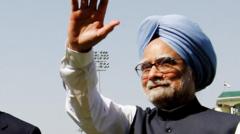In the wake of his passing, India is contemplating the extensive contributions of former Prime Minister Manmohan Singh, who served two consecutive terms from 2004 to 2014. Recognized as a fundamental cornerstone of India’s economic liberalization, Singh’s policies ushered the nation into a new era of growth. He was not only the first Sikh to hold the office but also the first prime minister since Jawaharlal Nehru to return for a successive term, marking a significant return for the Congress party.
Singh's journey began when he was appointed finance minister in 1991, during a time when India faced severe economic difficulties. Under his leadership, the economy began a process of deregulation and liberalization, implementing crucial measures that included devaluation of the currency and privatization of state-owned enterprises. His memorable assertion in parliament that "no power on Earth can stop an idea whose time has come," became a mantra that illustrated his conviction towards necessary reforms. The successes of his initiatives became evident, and by the time he became Prime Minister, the economy had begun its ascent, lifting millions out of poverty and positioning India as one of the fastest-growing economies globally.
However, Singh's leadership was not without criticism. While he gained a reputation as a "reluctant prime minister," often characterized as being under the influence of the Gandhi family, he managed to showcase his own authority and economic acumen. His administration saw an impressive average GDP growth of around 8% and is credited with protecting India from the repercussions of the 2008 global financial crisis. Yet, his second term was marred by corruption allegations against several cabinet members, although his integrity remained intact in the public eye. Singh's hopes for a kinder historical judgment highlight his anticipation that future generations would appreciate the challenging political landscape within which he operated.
Among his significant contributions were also foundational laws that advanced Indian democracy, such as those ensuring the right to information, education rights for children, and rural employment schemes that strengthen the livelihoods of millions. These initiatives remain vital in contemporary discussions on social equity and public accountability.
Singh's role as a reconciliation figure came to light with his formal apology to the Sikh community for the 1984 anti-Sikh riots, an unprecedented act from a prime minister that conveyed a profound sense of accountability.
Moreover, in a significant milestone for international relations, Singh negotiated a landmark 2008 nuclear deal with the United States, ending India's nuclear isolation and opening the door for civilian nuclear cooperation. Although the agreement was met with substantial opposition due to concerns regarding sovereignty, Singh’s determination was apparent as he successfully navigated the political landscape to secure both the deal and his government’s stability.
Manmohan Singh’s multifaceted legacy as a leader and reformer showcases a balance of economic development, social justice, and international diplomacy that continues to resonate in India's trajectory. As India remembers his contributions, the transformative impact of his leadership remains a pivotal chapter in the nation’s emerging narrative.
Singh's journey began when he was appointed finance minister in 1991, during a time when India faced severe economic difficulties. Under his leadership, the economy began a process of deregulation and liberalization, implementing crucial measures that included devaluation of the currency and privatization of state-owned enterprises. His memorable assertion in parliament that "no power on Earth can stop an idea whose time has come," became a mantra that illustrated his conviction towards necessary reforms. The successes of his initiatives became evident, and by the time he became Prime Minister, the economy had begun its ascent, lifting millions out of poverty and positioning India as one of the fastest-growing economies globally.
However, Singh's leadership was not without criticism. While he gained a reputation as a "reluctant prime minister," often characterized as being under the influence of the Gandhi family, he managed to showcase his own authority and economic acumen. His administration saw an impressive average GDP growth of around 8% and is credited with protecting India from the repercussions of the 2008 global financial crisis. Yet, his second term was marred by corruption allegations against several cabinet members, although his integrity remained intact in the public eye. Singh's hopes for a kinder historical judgment highlight his anticipation that future generations would appreciate the challenging political landscape within which he operated.
Among his significant contributions were also foundational laws that advanced Indian democracy, such as those ensuring the right to information, education rights for children, and rural employment schemes that strengthen the livelihoods of millions. These initiatives remain vital in contemporary discussions on social equity and public accountability.
Singh's role as a reconciliation figure came to light with his formal apology to the Sikh community for the 1984 anti-Sikh riots, an unprecedented act from a prime minister that conveyed a profound sense of accountability.
Moreover, in a significant milestone for international relations, Singh negotiated a landmark 2008 nuclear deal with the United States, ending India's nuclear isolation and opening the door for civilian nuclear cooperation. Although the agreement was met with substantial opposition due to concerns regarding sovereignty, Singh’s determination was apparent as he successfully navigated the political landscape to secure both the deal and his government’s stability.
Manmohan Singh’s multifaceted legacy as a leader and reformer showcases a balance of economic development, social justice, and international diplomacy that continues to resonate in India's trajectory. As India remembers his contributions, the transformative impact of his leadership remains a pivotal chapter in the nation’s emerging narrative.





















